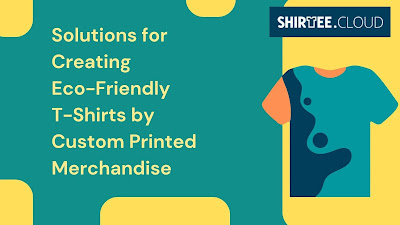Solutions for Creating Eco-Friendly T-Shirts by Custom Printed Merchandise
Are you interested in finding ways to create eco-friendly t-shirts? If so, you may have discovered many different options for doing so. You can choose from various materials and different garments, depending on your personal preferences and the degree of eco-friendliness you would like to achieve.
This blog will discuss some of the most common eco-friendly t-shirt materials and why eco-friendly t-shirts are beneficial by custom printed merchandise.
Solutions for Creating Eco-Friendly T-Shirts
Eco-friendly t-shirts are a great way to promote your brand while also helping the environment. Here are some tips for creating eco-friendly t-shirts:
- Buy Organic Cotton: If you want an eco-friendly fabric, consider organic cotton, which is much more sustainable than other fabrics because it's grown without pesticides or synthetic fertilizers.
- Get an Eco-Friendly Printer: Print on demand merchandise is ideal for producing eco-friendly items because there's no waste. In addition, many custom-printed merchandise printers offer environmentally friendly products like soy inks and waterless printing processes that don't emit emissions into the air or use hazardous materials.
- Choose Non-Toxic Ink: When choosing ink colors, ensure they're non-toxic so they won't leach chemicals onto the shirt. You should also avoid metallic or glitter inks, as these have been shown to contain lead and other heavy metals.
- Customize Your T-Shirt Options: To make your custom shirts even more eco-friendly, choose a screen printing process instead of heat transfers or vinyl prints. Screen printing uses organic inks that can be easily washed with soap and water - making them reusable!
- Use Recycled Materials: Using recycled materials is another way to help keep your company green. It's easy to find custom-printed merchandise made from recycled paperboard and recycled fibres when shopping online at Etsy print on demand or PrestaShop print on demand.
Remember that some recycled material may have traces of toxic dyes or chemicals from past production runs, so it's important to read labels carefully before buying anything.



Comments
Post a Comment